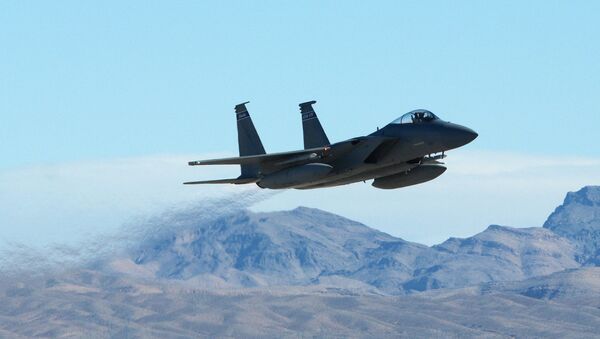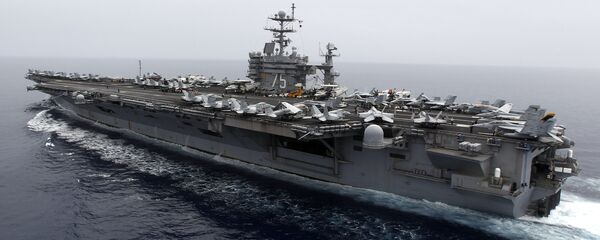Radio Sputnik discussed Tel Aviv's strike on Syria with Yezid Sayigh, a senior fellow at the Carnegie Middle East Center in Beirut.
Sputnik: Can you comment on the events of the past couple of days, the alleged chemical attack and the Israeli strike, the reported Israeli strike on the Syrian Air Force Base in Homs?
Yezid Sayigh: Clearly, the situation now is volatile in that the Israeli strike is very oddly timed. In the past when the US has been in a situation like this, where it's considering military action or feels that it needs to take very delicate, diplomatic and possibly military action. It has pressured Israel not to act and to stay out of the situation so that the US can manage the situation more effectively. And it's very odd that the Israelis have gone ahead with the strike, probably pursuing their own separate agenda of confronting or pressuring the Iranian presence in Syria. So I don't think this is going to get in the way of the US going ahead anyway with some form of action. But clearly there's a certain level of confusion here, I don't think the Israeli strike is necessarily part of the American response at all.
READ MORE: Why Israeli Attack on Syrian Airbase, Alleged Douma Attack Fall Within One Trend
Sputnik: So you think that the Israeli strike is primarily motivated by a desire to send a message to Syria, to the Iranians that their presence is not wanted here?
Yezid Sayigh: That's been the purpose of Israeli strikes over the past period.
Certainly, in February the very heavy set of raids that they launched against various targets around Syria, in areas that they'd previously stayed out of in agreement with Russia and others.
READ MORE: Trump 'Delegated' Israelis to Attack Syrian T-4 Airbase — Syrian General
It might have been that they had intelligence about a particular asset; it might have been a weapons system or a person that they were nervous about or just sending a signal to the regime. Given that the regime's apparent resumption of using chemical weapons could point to a more aggressive posture in the south of Syria, the Israelis might be giving a sort of advanced warning that doesn't get too confident about your ability to move next from Damascus towards areas that are closer to the Israeli border. I mean there's this strategic perspective from the Israeli side.
Sputnik: The timing is strange but it seems that there are rumors that the Israelis informed the US of the plan to strike the Air Force base in Homs. For the first time, there was no indication that Russia was not warned about this strike in advance. How can you explain that because Russia has fairly good relationships with Israel and previously Netanyahu had always warned Russia that they were planning to strike?
Yezid Sayigh: It goes beyond having good relations or the prime minister or Russian president sort of contacting each other. There's a formal setup in which they exchange information and communications about military actions. And so the possibility that the Israelis had given Russia no advanced warning whatsoever certainly would be unusual and we have to be a little bit doubtful as to whether in fact, Russia received no advanced warning at all. It might have been that the advanced warning was five minutes before but that said, the fact that the Israelis fired missiles at a long distance from Lebanese airspace might have been a way of avoiding notifying Russia i.e. that by not entering Syrian airspace they felt they didn't have an obligation to give advanced warning to Russia. It would make sense that they tell the Americans because if they're doing something that the Americans might not really want, the Israelis would at least have given advanced warning and be able to say, look we decided to go ahead for our reasons these are what the reasons are, we gave you advanced warning but we weren't going to carry out this strike.
So it's interesting why the Israelis at this point would have decided to go ahead at this precise moment and I think we just can't really do much more than saying that at this stage. We just don't know enough as to what the Israelis were trying to hit or whether as I pointed out earlier they anticipated the Assad regime has taken over the Eastern Ghouta will move to consolidate its control in the rest of the south of the country which becomes a lot closer to the Israeli occupied Golan Heights. And this is an area where Iran is involved, Hezbollah is involved, and of course, Israeli interests are involved. And so the Israelis might be stepping up their own pressure campaign against the Assad regime, saying don't think we can't go and hit you wherever we want, despite the Russian cover we can do what we want. So this might be part of a different parallel campaign as it were of Israeli pressure against the Assad regime that is separate from any sort of one-off incidents like the chemical weapons attack and an American response.
Sputnik: Why do you think the Israelis have still not really given much comment regarding this response? Why do you think they've taken that posture?
Yezid Sayigh: What they're doing and why they have at various times indicated that they've struck some special, I mean, what they usually say is that they're preventing, they sort of restate the red lines which are to prevent Hezbollah from acquiring certain weapons capabilities whether inside Syria or inside Lebanon they've warned against Iran Hezbollah setting up a direct presence in the border close to the Israeli occupied Golan Heights. So you never know exactly what it is they struck, but they do give clear indication of the sort of things that they're worried about.
The views and opinions expressed by Yezid Sayigh are those of the expert and do not necessarily reflect those of Sputnik.




